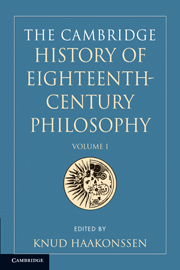Book contents
- Frontmatter
- CONTENTS
- Preface
- Methods of reference and abbreviations
- List of contributors
- I The Concept of Eighteenth-Century Philosophy
- II The Science of Human Nature
- 7 Philosophical Methods
- 8 Human Nature
- 9 Perception and Ideas, Judgement
- 10 Self-Consciousness and Personal Identity
- 11 Reason
- 12 Substances and Modes, Space and Time
- 13 Causality
- 14 Knowledge and Belief
- 15 Scepticism
- 16 Philosophy of Language
- 17 Rhetoric
- 18 Aesthetics
- 19 The Active Powers
- 20 Education
- Biobibliographical Appendix
- Bibliography
- References
8 - Human Nature
from II - The Science of Human Nature
Published online by Cambridge University Press: 28 March 2008
- Frontmatter
- CONTENTS
- Preface
- Methods of reference and abbreviations
- List of contributors
- I The Concept of Eighteenth-Century Philosophy
- II The Science of Human Nature
- 7 Philosophical Methods
- 8 Human Nature
- 9 Perception and Ideas, Judgement
- 10 Self-Consciousness and Personal Identity
- 11 Reason
- 12 Substances and Modes, Space and Time
- 13 Causality
- 14 Knowledge and Belief
- 15 Scepticism
- 16 Philosophy of Language
- 17 Rhetoric
- 18 Aesthetics
- 19 The Active Powers
- 20 Education
- Biobibliographical Appendix
- Bibliography
- References
Summary
INTRODUCTION
‘Human nature’ in eighteenth–century philosophy is linked to the idea of surveying, analyzing, and discussing human beings, practices, social arrangements and behaviors in their variety and particularity. The great thinkers we associate with the Enlightenment, such as Hume, Montesquieu, Diderot, Herder, and Kant, and the great collaborative projects, such as the Encyclopédie, offer accounts of man centered on four common theses: (1) that the scientific analysis of man is crucial to the success both of science as such and enlightenment; (2) that human activities and human creations are central to the analysis of man; (3) that the human sciences are systematic in intent and universal in scope; (4) and that human nature is everywhere uniform and unites humankind both as objects of study by the sciences and as subjects capable of enlightenment. Often these theses were presented within a ‘Newtonian’ philosophy that meant little more than a vague scientism. Although there are many exceptions, this is the common Enlightenment ideal of how to account for man. It is well captured by Mme. Lambert: ‘[T]he highest science is the science of man…[and] as nothing is more equivocal than the actions of men one must continuously return to principles if one wishes to understand him’.
Yet, in text after text, as soon as these restrictive theses are stated, they are violated – particularly the fourth. In the works of Hume, Diderot, Montesquieu, Kant, and many lesser lights, men do not seem terribly uniform but are divided up into sexes, races, national characters, the sighted and the blind, and many other categories.
- Type
- Chapter
- Information
- The Cambridge History of Eighteenth-Century Philosophy , pp. 160 - 233Publisher: Cambridge University PressPrint publication year: 2006
References
- 5
- Cited by



